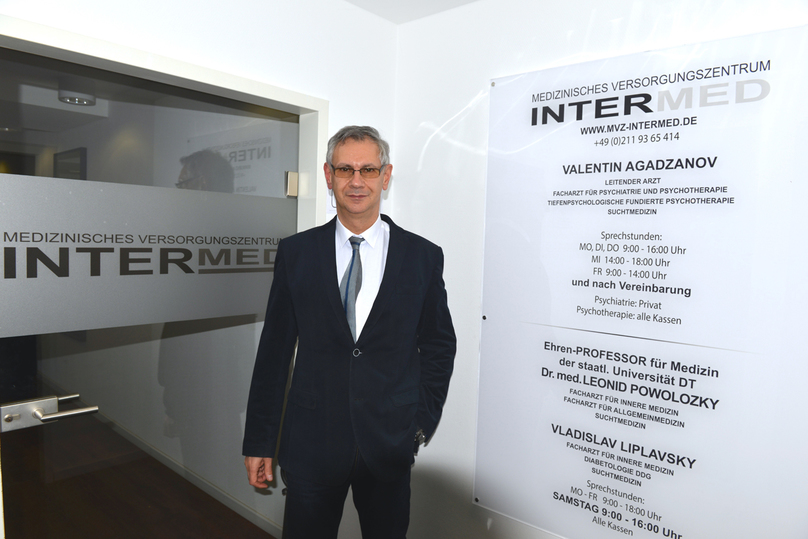“In recent months, the number of patients with various mental problems has increased significantly,” says a psychotherapist, head of the InterMed in Dusseldorf Valentin Agadzhanov. The psychotherapist answered the questions of our editorial board and told how alcoholism and depression are treated in Germany, and what the coronavirus pandemic has turned out to be for his patients.
─ Doctor, there is an opinion in Germany that Russia is the most drinking country in the world. In my opinion, many Germans cannot imagine a Russian person without vodka …
Valentin Agadzhanov: Of course, this is a stereotype that has nothing to do with reality. According to the Organization for Economic Cooperation and Development (OECD) rating for alcohol consumption per capita, Russia is now in seventh place with an indicator of 11.1 liters per person. Germany, by the way, took eighth place (10.8 liters per person). As they say, the numbers speak for themselves. It should be noted that the consumption of alcohol in Russia has significantly decreased since 2007. One thing is true that Russians have a different drinking culture. In Russia, it is customary to drink highly alcoholic beverages, to put it simply, vodka. In Germany, it’s beer. This tradition is connected, first of all, with the climate, because Russia is the coldest country in the world. Moreover, life in Russia has always been difficult. So they kept warm with vodka, used it as a medicine and as an antiseptic. That is, in almost all areas. In addition, high-percentage alcohol is also a high-calorie product. Thus, the required amount of energy can be quickly obtained.
─ And have we always been somehow patient with people who drink, or is this also a cliché?
─ Alcoholism is a disease from the group of addictions. When we get the flu, we have a social responsibility, for example, we don’t go to work so as not to infect our colleagues. Alcoholism has much more, so to speak, “social introduction” into life, it has huge social consequences. The point is that the alcoholic’s standards of behavior change. His very personality is changing. For an alcohol addict, all jokes are associated with drinking, food is called a snack, practically, the whole life is subordinated to alcohol.
– But not everyone develops alcohol dependence.
─ If a person has mental pain, fears and he uses alcohol to cope with them, he is guaranteed to become an alcoholic. That is, drinking in order to drown out your depression, dissatisfaction, to get out of reality means to develop alcohol dependence in yourself. Alcohol inhibits mental activity, causes dangerous euphoria, and removes barriers. But when the effects of alcohol stop, the person develops depression, caused precisely by the intake of alcohol. It turns out a vicious circle: a person feels bad, he drinks, after sobering up he feels bad again, and he drinks again. So the question is not how much to drink, but why. Remember how the drunkard in “The Little Prince” says that he drinks to forget that he is ashamed to drink.

The team at the InterMed Medical Center in Dusseldorf.
─ Is there a difference in the methods of treating alcoholism in Germany and in Russia?
─ In Germany, alcoholism is treated with so-called substitution therapy. That is, alcohol is replaced by another drug, and then its dose is gradually reduced. In Russia, a fundamentally different approach. There, intoxication is considered as intoxication, therefore detoxification measures are carried out, that is, the patient is given droppers or plasmapheresis is done. Besides, people are “sewn up” there. This is a punishment-based therapy. Moreover, when a person drinks, he receives a strong negative reaction. For example, vomiting for many hours, palpitations, or unbearable pain. But punishment alone cannot stop a person’s desire.
─ What technique is used in your medical center?
─ The approach to the treatment of alcoholism should only be multimodal, that is, there should be a combination of medication and psychotherapy. We have moved away from prohibitive methods and are working with patients so that they can take alcohol in a controlled manner. After all, if you come to some party where everyone drinks alcohol, and you are mineral water, then you feel uncomfortable. As a result, you still break the ban, get drunk, and the next day a real binge begins. We create such a situation when the patient learns to say in time: “Stop! Enough for me! ” In addition, we provide therapy to stabilize his mental state. All this is done with the help of medicines. But the most important thing is to understand why a person got alcohol addiction. What kind of heartache does he soothe? Therefore, in our InterMed center, psychologists work closely with general medicine and drug addiction doctors.
In a patient suffering from alcoholism, the internal organs, primarily the liver, are damaged. In our center, we use the latest Siemens equipment, with which we not only see the internal organs, but even determine their density. This gives us the information we need for the most accurate diagnosis. And only after receiving the general picture – both psychological and physical condition of the patient, we can begin treatment. This is the newest path. Alcoholics Anonymous or the 12-step principle is gradually becoming a thing of the past.

─ Today everyone is talking about depression, which, one might say, has become a “popular” disease. Can only psychotherapy and antidepressants help here?
─ It all depends on what kind of depression we are talking about. There is, for example, a theory that depression can be caused by gastrointestinal or lung disease. And here we use special medicines, achieving excellent results. We had a patient who was not helped by antidepressants or psychotherapy. I noticed that he was coughing slightly all the time. We tested him and found a special lung bacterium that causes severe depression. He underwent a special course of treatment with us, after which his symptoms of depression disappeared, anxiety disappeared, and his sleep stabilized. On the other hand, some antidepressants can increase a person’s weight, which leads, say, to hypertension, or interferes with sexual desire.
And the psychotherapist says: “This is no longer for me, go to a cardiologist or urologist.” I consider this approach unacceptable. You can’t just identify one disease. Everything needs to be seen comprehensively. It is important to understand that depression is a serious illness that does not depend on external circumstances. So all these advices, such as: “Pull yourself together, or watch comedy!”, Will not help in any way. It was in the Soviet Union that depression “did not exist”, and the disease was understood by Soviet psychiatrists as neurasthenia. That is, the school of psychotherapy was completely forgotten. Meanwhile, the founder of behavioral psychotherapy is none other than Ivan Petrovich Pavlov. His doctrine of conditioned and unconditioned reflexes was taken in the Soviet Union, but the direction of behavioral psychotherapy was completely rejected. But it was picked up by American scientists and developed it. By the way, it is now being successfully used in Germany.
─ How has the coronavirus affected your center? Are there more patients with different mental problems?
─ Definitely yes. Moreover, the number of such patients has increased dramatically. For example, people who tried to hide their alcohol addiction no longer hide it. People even come to InterMed in a drunken, hysterical state, cases of suicide danger have increased. Here we have to provide quick and effective help. In addition, the number of patients with a wide variety of phobias, suffering from attacks of fear, obsessive states, has increased. After all, practically no one says that because of general isolation, people are often mentally disturbed. We do not know how those who have recovered from the coronavirus endured this trauma, what consequences it will have on their lives. In all my medical practice, I don’t remember that any disease had such a colossal media effect. This has a tremendous psycho-emotional impact. Vaccines have not yet been created, medicines, too, and now a person is told that he has a coronavirus. This is a serious prerequisite for the development of various psychosomatic diseases and even depression in anxious individuals. Therefore, at the peak of the pandemic, there were up to 200 patients a day in our center.
Daria Boll-Palievskaya.
Germany says this:
Germany: Ultraviolet technology against Covid-19
Airlines against tougher quarantine for travelers
Germany: Kassel amusement park can be visited by up to 3,000 visitors
German Pediatric Association: Teachers must wear masks during lessons too